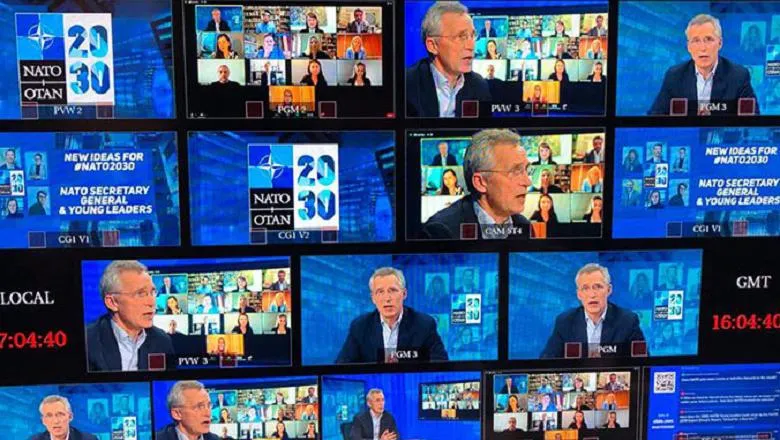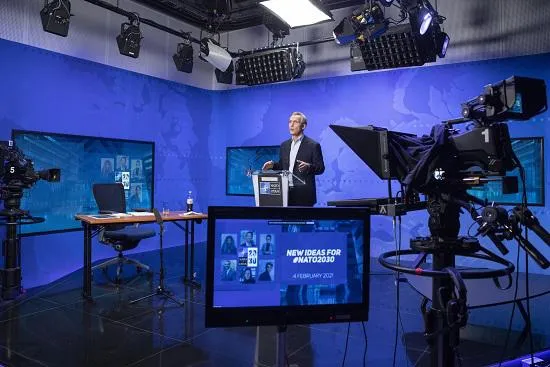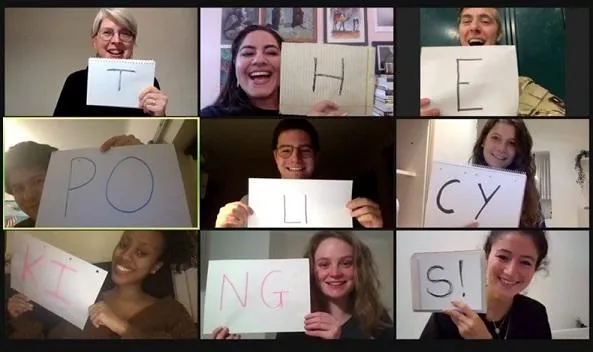“Your generation has the greatest stake in our future, so it is essential that your voices are heard, together, we can make NATO stronger to keep our nations safe on both sides of the Atlantic”
Jens Stoltenberg, NATO Secretary General
08 February 2021
School of Security Studies students shaping agenda for NATO 2030
Students from War Studies and Defence Studies joined a Hackathon with NATO’s Secretary General

On Thursday 4 February 2021, a team of 10 BA, MA and PhD students from the School of Security Studies presented their innovative ideas and proposals at a live event with NATO Secretary General Jens Stoltenberg, the NATO 2030 Young Leaders and other invited guests.
The event followed a week-long policy hackathon, with the Security Studies team developing proposals on the challenge of ‘People First: Protecting Populations in Modern-Day Conflicts’.
The engagement was part of the ‘New Ideas for NATO 2030’ online event, organised in partnership with Chatham House, on the vision of the future of the transatlantic Alliance, one that “guards its strengths and values with the one hand and embraces change with the other”. Ideas from the event will feed into Secretary General Jens Stoltenberg’s strategic-level recommendations on NATO 2030 to Alliance leaders at their summit in Brussels in the first half of this year.
As part of the event, students from 10 universities from around the world, with King's College London the only UK contribution pitched their ideas for NATO 2030 live in front of a jury of experts, concluding NATO’s first policy hackathon.

The King’s students laid out concrete recommendations based on ‘a more comprehensive, holistic, and inclusive understanding of security towards the 2030s’. The recommendations were articulated around five leading themes: defence and deterrence; NATO values; NATO partnerships and cooperation; climate change and emerging disruptive technologies. They are further elaborated in a 24-page report entitled NATO 2030: Embrace the change, guard the values – A report by the NATO 2030 Young Leaders Group, for this Generation and the Next.
An expert jury as well as the live audience voted on the winning team, with Freie Universität Berlin coming first place with their pitch on ‘Innovating innovation: next steps in Allied technology cooperation’.

The NATO 2030 Young Leaders Group was established at the NATO 2030 Youth Summit on 9 November 2020, as part of NATO’s 2030 initiative to make sure the Alliance remains ready to face tomorrow’s challenges.
Sebastian Beyenburg, final-year BA International Relations, discusses the experience:
Giving young people a voice
I believe it is important for young people to shape NATO policy because not only will we be the ones who will have to do policy at NATO in a few years, but I also think that a big, bureaucratic institution like NATO needs fresh minds and fresh ideas in order for the organisation to stay relevant.
Benefits and challenges
The best part for me was working with an amazing team of like-minded and dedicated people who really wanted to use this opportunity in the hopes of making some small changes to how the world works. It was also fantastic to see how well we interacted and got along despite everything being online. It was also great to see how much you can accomplish in four days and nights when you are part of a well-functioning, fun team.
The most challenging aspect was compressing our many policy ideas into a short four-minute video pitch. We had done considerable research before finding out the pitch was only allowed to be four minutes and so we needed to decide what the most important aspects to include are. We also managed to do all of this across different time zones!
How my degree supported me
My degree in International Relations equipped me for the challenge in the sense that I had a grasp of the concept of protection of civilians (our topic) and that I knew how to write policy because I had learnt how to write policy briefs. I knew far less about NATO though, so I learnt a lot about the organisation! Above all, I would say that I enhanced my team-work skills, listening to other people's opinions and making compromises to come up with the best possible policy!
Cristina Romero-Caballero Cuttell, MA International Relations student said:
Giving young people a voice
Young people are the future, they are the ones that one day will be leading NATO, so it makes sense for their voices to be listened and for them to be given the opportunity to shape NATO´s future policies.
Young people also bring fresh ideas and have different priorities to the incumbents of NATO, priorities that will be the future´s main concerns: climate change, the rapid change in technology, the respect of human rights and the protection of civilians. So, I think this NATO 2030 Hackathon has been a brilliant way of bridging NATO and the voices of the future.
Benefits and challenges
For me the most enjoyable aspect was being able to meet and work with such an amazing group of people. It was a lovely experience to feel part of something, of something great, feeling we were making a positive impact in NATO.
The most challenging aspect was narrowing down the topic ‘Protection of Civilians’ to specific implementable and feasible policies that would improve NATO´s mission of maintaining peace worldwide.
The most valuable skill strengthen was team-work and collaboration. Although, I have worked in teams before, this was an exceptional circumstance, working under pressure, 10 strangers to deliver an implementable policy in just four days. I proved to me that team-work is essential to succeed, it allows you become more open-minded, a better listener and more collaborative. This project wouldn´t have been able to be done individually, proving team-working is key to overcome many challenges in life, in the workplace and in academia.
How my degree supported me
My degree enabled me to gain a wider understanding of world politics, to know the threats and challenges NATO is facing. It provided a strong baseline from which to build my arguments and suggestions that then I put forward to the team.
